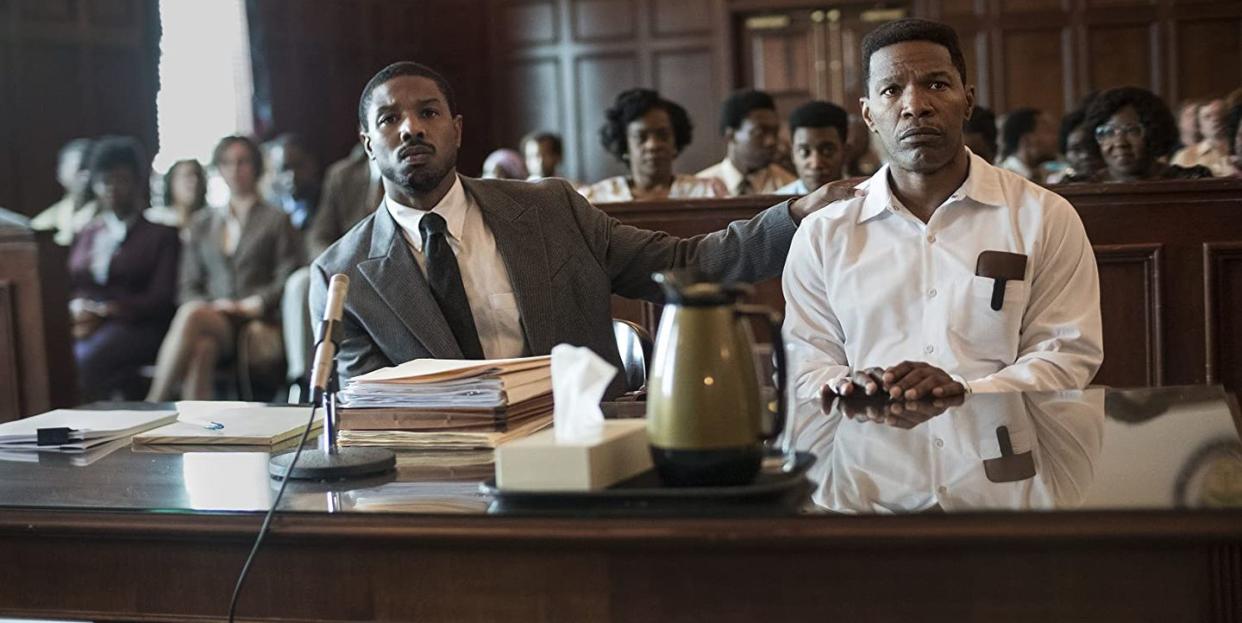Equal Justice Initiative From 'Just Mercy' Has Saved 135 Wrongly Accused Prisoners From Death Row

Just Mercy gave the incredible work of the Equal Justice Initiative (EJI) a bigger spotlight, but there are so many unknown stories that have made Bryan Stevenson's nonprofit a leader in justice and equality.
Stevenson, the civil rights lawyer and author played by Michael B. Jordan in the critically-acclaimed film, started the Equal Justice Initiative in Montgomery, Alabama in 1989 with a hope to tackle criminal justice reform and racial injustice in our country. Per their mission statement, "The Equal Justice Initiative is committed to ending mass incarceration and excessive punishment in the United States, to challenging racial and economic injustice, and to protecting basic human rights for the most vulnerable people in American society."
The 80-plus workers at the Equal Justice Initiative know firsthand that the poor and people of color, are disproportionately imprisoned. According to their website, African Americans make up 42% of people on death row and 34% of those executed, but only 13% of the American population is Black, according to the U.S. Census Bureau. While the EJI advocates for parole reform, safe prison conditions, and increased support for imprisoned children, their work with the wrongly convicted is what sets them apart from other justice-focused nonprofits. To date, they have have won reversals, relief, or releases for more than 135 wrongly-condemned prisoners on death row, and won relief for hundreds of others who were wrongly-convicted or unreasonably sentenced.
Walter McMillian, the subject of Just Mercy, may be the Equal Justice Initiative's most famous success story, but there are other faces and names worth knowing, including:
Lydia Diane Jones was released from prison on August 17, 2006 for a crime she didn't commit. In November 1997, she moved to her parent's house to help care for her ill father, and let her ex-boyfriend live in her empty home. She was unaware at the time that her ex-boyfriend was selling drugs in her home. When she dropped by to pick up some belongings, officers made an unannounced forced entry and forced Jones at gunpoint. She was arrested four months later for drug trafficking, and later sentenced to life in prison without parole. After six years in prison, EJI won her release.
Marsha Colbey was released from prison on December 12, 2012. Following Hurricane Ivan, the mother-of-six, who was pregnant at the time, moved her family to a FEMA trailer. She went into premature labor and delivered a stillborn baby while there. She was unable to revive the baby, and later buried it in a marked grave near the trailer. A state forensic pathologist claimed the baby was born alive, leading to a conviction of capital murder in 2007. She was sentenced to life imprisonment without possibility of parole — but the EJI successfully won a release in 2012.
Anthony Ray Hinton was exonerated from death row on April 3, 2015. Thirty years prior, he was arrested and charged with two capital murders solely because his mother's revolver was used in two robberies at Birmingham fast food restaurants, which resulted in the fatal shooting of John Davidson and Thomas Wayne Vason. The police had no suspects, and Hinton was working in a locked warehouse 15 miles away while the crime was committed — yet he was still arrested in charged. He served 30 years in prison before his release.
Along with their work in the courtroom, the Equal Justice Initiative regularly leads thoughtful conversations about race in the United States. As their website states, "EJI believes we need a new era of truth and justice that starts with confronting our history of racial injustice."
In hopes to educate more people about the realities of the Black community in America, they opened the Legacy Museum: From Enslavement to Mass Incarceration and the National Memorial for Peace and Justice in Montgomery, Alabama in 2018. The museum, which is built on the site of a former warehouse where slaves were imprisoned, uses first-person accounts to tell the truth behind "the enslavement of African Americans, the evolution of racial terror lynchings, legalized racial segregation and racial hierarchy in America." Just a four-minute walk away, you'll find the country's first memorial dedicated to enslaved Black people, those terrorized by lynching, African Americans affected by racial segregation and Jim Crow, and people of color who have dealt with presumptions of guilt and police violence.
A post shared by Equal Justice Initiative (@eji_org) on Dec 10, 2019 at 4:46pm PST
The Black Lives Matters protests following the deaths of George Floyd, Breonna Taylor, and Ahmaud Arbery, continue to shed light on the important work done by Stevenson and the EJI. "We need to reckon with our history of racial injustice. I think everything we are seeing is a symptom of a larger disease. We have never honestly addressed all the damage that was done during the two and a half centuries that we enslaved Black people," Stevenson told The New Yorker. "It’s not just anger over what happened to George Floyd or Breonna Taylor or Ahmaud Arbery. It is anger about continuing to live in a world where there is this presumption of dangerousness and guilt wherever you go."
In light of recent events, companies like Amazon, Apple, and Etsy have donated to the Equal Justice Initiative to help Stevenson and his colleagues continue their life-changing work. To donate, please click here.
You Might Also Like
